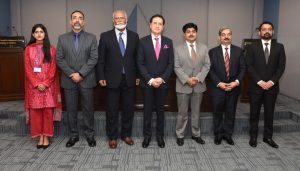Seminar: ‘Emerging Trends in Aerospace Power: Options for Pakistan’

A seminar titled “Emerging Trends in Aerospace Power: Options for Pakistan” was conducted by the Centre for Aerospace & Security Studies (CASS), Lahore. Aerospace power is the ability to use air and space capabilities to achieve wide-ranging civil and military objectives in economic, commercial and scientific domains. Pakistan stands at the threshold of numerous opportunities to capitalize on emerging trends like space exploration, satellite technology, unmanned aerial system, and electric propulsion of green aviation. The seminar focused on options for Pakistan regarding aerospace power.
Air Commodore Khalid Iqbal (Retd), Director National Security, CASS, Lahore, delivered the introductory remarks. His speech was followed by a keynote address by Major General Ahmed Bilal (Retd), former Chairman Space & Upper Atmosphere Research Commission (SUPARCO), who highlighted the prevalent global aerospace trends.
Dr Ali Sarosh, Associate Professor, Air University, focused on the evolution of Space power in South Asia, including its military and civil applications while Professor Dr Ahmed Saeed Minhas, DHA Suffa University elucidated on gaps in international Space law and viable developmental strategy for Pakistan’s Space programme .
Following the guest speakers’ remarks, an extensive question and answer session was held to delve into the depths of the topic.
Air Marshal Asim Suleiman (Retd), President, CASS Lahore, in his concluding remarks, said that Pakistan’s national space policy should prioritize private sector participation in research and development, and encourage commercial sector involvement. He added that Pakistan should focus on space technologies, infrastructure, industrial, technological potential, and human resource. He further said that the national security strategy of a country recognizes the importance of maintaining access to space, considering that space-related technologies are crucial for determining a nation’s military strategy. The President also said that Pakistan must integrate space-related services in the mainstream setups for better governance, efficient functioning, sustainable development, and social well-being.
The most important takeaways from the seminar were:
A three pronged National strategy be pursued as the ‘Way Forward’: Firstly, ensure full scale applicability of available Aerospace capability and resources for socio-economic development and national security; Secondly, achieve self-sufficiency/ indigenization as far as possible in the short/ medium term, meeting the basic needs over complete spectrum of Aerospace; and Thirdly, synergize the National effort for sustained growth of the Aerospace sector.
The national space policy should be based on realistic objectives, considering ground realities, national ambitions, and the international environment. It should be a well-thought-out institutional mechanism that creates linkages between state-controlled and commercial activities, ensuring preservation of national priorities and safeguarding state interests. There is a need to rejuvenate the National Space Policy to generate a new vigor towards development of space capability and capacity for application in civil and military domains.
At the international level, the space sector is growing exponentially, with public-private partnerships (PPP) in R&D aimed at acquiring next-generation capabilities. To ensure the success of Pakistan’s space programme, it is crucial for the national leadership to set goals, allocate resources, and develop a credible infrastructure.
The success of the aerospace programme hinges not only on recognizing the significance and utility of aerospace technologies in socio-economic and national security domains, but also on harmonizing national endeavours to attain these goals.
Editor: Raja Kamran